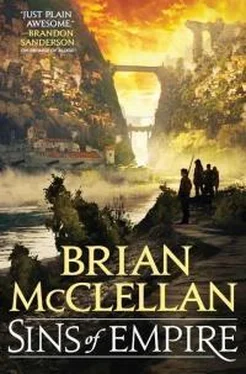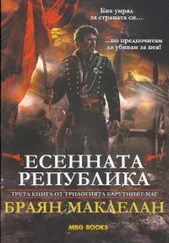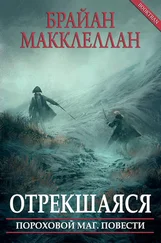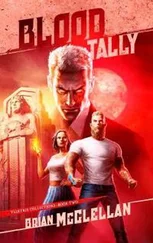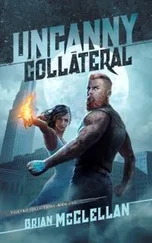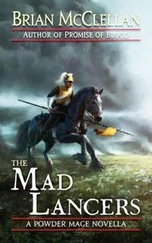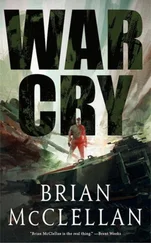Meln-Dun swallowed, beads of sweat appearing on his balding head.
“In my world,” Vlora said, “wars are declared .”
“Not in mine,” Meln-Dun responded. “I am not your enemy. I am not one of Mama Palo’s agents, and I know nothing about the disappearance of your men.”
Vlora watched his eyes for any sign of a lie. He met her gaze, unwavering.
Meln-Dun continued: “Mama Palo is crafty, striking from the shadows. She is an old woman, embittered toward the Kressian settlers who killed her husband, and the Blackhats who killed her son.”
Vlora opened her mouth, surprised. “I did not know that.”
“It’s common knowledge in the Depths. We all have our own reasons for fighting our private wars. Mama Palo has taken hers public. As I said, she is an old woman, and old women are seldom direct. They achieved their age by being crafty, circumspect. Those Palo that attacked you outside the Yellow Hall may very well have been her men. They botched the job and now are trying to make up for it by whittling away at your forces.”
“Inviting me to the party was a way to get me out on my own?”
“It could have been.” Even now, Meln-Dun seemed loath to accept the idea as fact. “There are a thousand factions within the Depths, intertwined in ways that reflect your own political courts. It may have been someone else entirely, but know this: Few people act in the Depths without Mama Palo’s say-so.”
“Do you?” Vlora asked bluntly.
“I will not lie to you. Most of my business is approved – or not – by Mama Palo.”
Another interesting bit of information. Mama Palo was bad for business in her encouragement of violence, and she could stifle Meln-Dun’s entrepreneurship? Another reason for Meln-Dun to want her out of the way.
“And this thing that we’re planning?” Vlora asked. “Beginning a modernization of the Greenfire Depths tenements?”
“She knows about our partnership.”
Vlora wasn’t surprised – they’d spent the last two days attempting to publicize her mercenaries’ good intentions. No doubt Meln-Dun had been involved in a similar propaganda campaign on the Palo side of things. The interesting part was that Mama Palo had approved of this whole endeavor. Perhaps the crafty old Palo was trying to draw Vlora out again, waiting for Vlora to make a mistake?
It was a game in which she couldn’t see her opponent’s face, or most of the pieces. Petty politics. I’ve fought much worse, she reminded herself.
Vlora wondered how much she truly trusted Meln-Dun. He was, after all, a Palo. Vlora tried to recognize that their reputation belonged mostly to a smear campaign by Lindet, but the Palo had also been her enemy in the swamps for over a year. She couldn’t just ignore that because Meln-Dun was friendly. But she had to trust someone, and Meln-Dun seemed to be trustworthy as far as his own interests were concerned.
There was a knock on the door, and a messenger appeared with a note for Meln-Dun. The businessman looked it over with a scowl, then nodded to himself. “I must go, Lady Flint, but I will do what I can to stop these disappearances and find your missing men. The sooner things calm down, the easier it will be to begin to modernize the Depths.”
He needs me more than I need him, Vlora realized suddenly. Or at least, he thinks that’s the case. It was best to let him keep thinking that. She shook his hand and watched him go, called for Olem, and sat down to meditate on the conversation. She drew her sword, checking the balance, deep in thought.
Of all the people Vlora had met in Landfall so far, Meln-Dun was in the best position to comment on Palo politics. Until she learned otherwise, his guess was as good as a declaration: Mama Palo was waging a war on Vlora and the Riflejacks. Vlora couldn’t be sure why : a grudge, tactical maneuvering, or even inside knowledge of Vlora’s real task. But it meant that Vlora had lost the element of surprise.
She couldn’t sit around waiting for Mama Palo to fall into her lap. She’d have to move quickly, or risk the disappearance of more of her men.
An attack on an enemy she knew so little about could very well get her and her men killed. It was risky. But Meln-Dun was Vlora’s wild card, and she thought she already had a way to use him.

It took Michel the rest of the day and part of the next morning to find just two mentions of the Palo Herald in the Blackhat files at the Millinery. One referred to a junk Palo press that might or might not be printing propaganda. The second was just an address scribbled down in pencil. Based on the limited pieces of information, both of which were months old, no one had ever bothered following up on any rumors that may have spurred the first report.
He left the Millinery just after noon the next day, leaving the address of the Palo Herald with Agent Warsim in case he took longer than twenty-four hours to report back in. He briefly considered trying to deputize a few Iron Roses to keep an eye on him, but opted just to bring along his old knuckledusters. The Millinery was still on full alert looking for Ben Styke, and Michel didn’t want to do anything that might bring on the grand master’s attention before he was absolutely certain he had a line on Tampo.
The address was in a mostly Palo village called Landon Plain. About six miles northwest of the plateau, it was one of the many towns along the Hadshaw built almost entirely upon pylons that allowed the rickety wood houses to weather spring flooding. It appeared to be a small, but thriving trading center with a keelboat landing, three general stores, and even a theater. Michel left his cab near the city center and began walking down the hard-packed silt streets, muttering the address over and over again as he scanned the number plates above homes and shops – only about a quarter of which were actually marked.
Michel had opted to leave his black shirt and bowler cap at home, and instead wore a loose pair of rough wool workman’s trousers and a cotton shirt, sleeves rolled up, flatcap pushed back on his head. A lone Blackhat in a Palo community tended to become a target; a poor Kressian day laborer might still get robbed, but would probably make it home in one piece.
A few eyes watched him as he passed, but no one followed him through the twisting streets. He was beginning to think the address was a dead end when he caught sight of a pair of number plates, the first two letters of which matched those on his card. He found a raised walkway and headed into a series of what looked like warehouses and industrial buildings, all constructed on the same batch of pylons. Palo workers moved bales of cotton and tobacco in and out of storage while foremen called out instructions. Michel was largely ignored.
He finally matched his address at the opposite end of the raised industrial park. There was a single door into a small shed of a building; a lean-to addendum to the warehouse next to it, with the words PALO HERALD stenciled in Palo on a sign next to the door. Michel peered in the window, then looked over his shoulder. There didn’t appear to be anyone around.
Nor, he decided, did this little building look big enough to hold even a small printing press.
Michel opened the door and headed inside, one hand on the knuckledusters in his pocket and the other putting a cheap pipe in his mouth as he adopted a northeastern accent in his head. “Hallo?” he called. “Hallo?”
The Palo Herald was about as roomy as an outhouse. There were a few crates, newspapers spilling out the sides, and an old Palo man sitting with his back to the same wall the door was on. He wore an old buckskin jacket over a bare chest and a pair of cutoff wool trousers. His feet were bare, and he squinted up at Michel suspiciously.
Читать дальше
